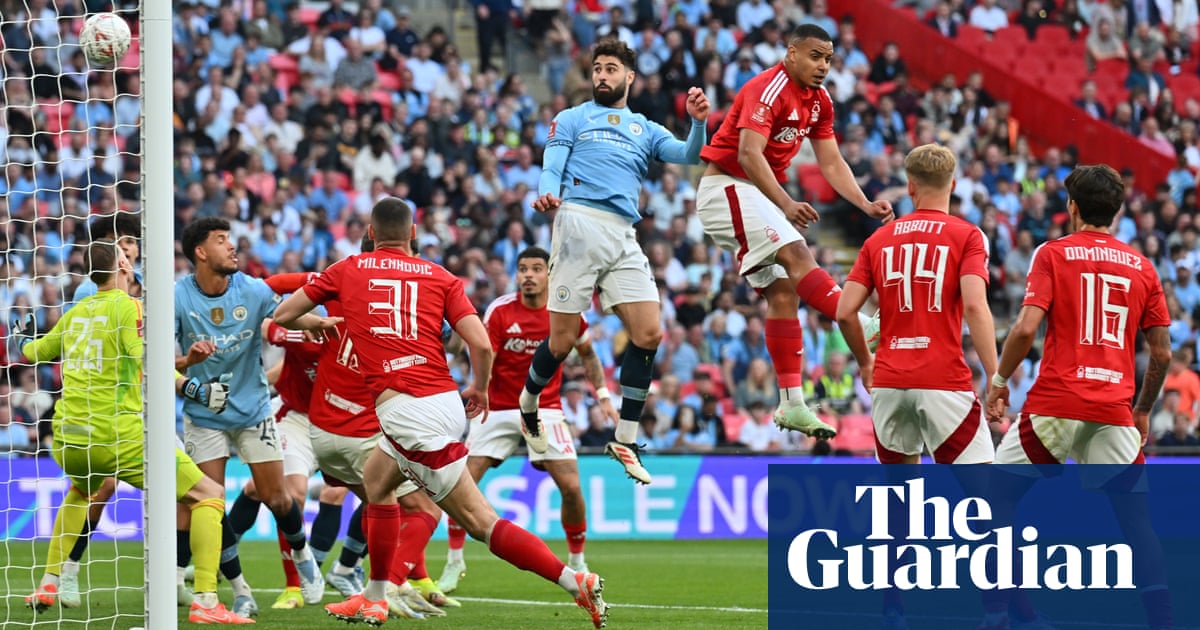It was a day when the FA Cup romantics could see the script for Nuno Espírito Santo andNottingham Forest, something to further embellish the manager’s hero status and the club’s finest season in at least 30 years. It was one when Pep Guardiola and Manchester City just refused to entertain it.
City led from the second minute through Rico Lewis’s second goal of the season and when Josko Gvardiol thumped home a header on 51 minutes shortly after a glaring miss by the Forest substitute, Anthony Elanga, it felt over. That Forest were repeatedly on the wrong side of the finest of margins thereafter only deepened their pain.
Three times they rattled the woodwork and when Taiwo Awoniyi, another substitute, completed the unhappy hat-trick towards the end, Forest knew it was not to be their day. Morgan Gibbs-White had twice been denied by the frame of the goal – the first after a blockbuster of a volley; the second from a tight angle when he looked to have enough of an empty net into which to aim.
And so City advanced from their seventhFA Cupsemi-final in succession to a final against Crystal Palace, Guardiola closing in on his 19th trophy at City. Like Forest, their attention will turn towards securing a top-five Premier League finish and Champions League qualification. An underwhelming season for them may yet end in glory.
Forest had won at Wembley in the 2022 Championship playoff final but you needed to go back to 1992 to find an appearance from them at the national stadium before that – the League Cup final defeat against Manchester United. The contrast to City was vivid. This was their 11th Wembley game under Guardiola in the FA Cup alone, taking in semi-finals and finals.
It was easy to believe that it was a grander adventure for the Forest fans, who packed out one half of the ground well before kick-off. How they bellowed their pre-match song, red-and-white scarves to the fore. But if the City seats featured a significant number of empties, those present and correct could luxuriate in more than Lewis’s breakthrough during the first half.
Guardiola’s approach at the outset flummoxed Nuno. The City manager set up with Savinho and Omar Marmoush as wide forwards; Lewis and Jack Grealish in central attacking midfield roles. Behind them, Bernardo Silva and Mateo Kovacic called the tune. Nico O’Reilly strode forward in rangy, eye-catching style from left-back.
City were always going to dominate possession and Forest gasped after the Lewis goal, chasing shadows. One of Guardiola’s moves was to have his players break on to the ball at pace from deeper areas, looking to slice through Forest’s lines.
Forest struggled to contain the outstanding Kovacic and he was the architect of the breakthrough, stepping away from Gibbs-White and drilling a pass up to Lewis that went through the legs of the defensive midfielder, Danilo. The covering red shirts could not get close enough to Lewis, who fired low across Matz Sels into the corner.
It was a hot day but that did not explain the lack of tempo in the first period. City revelled in their control. They were in the mood to suffocate; to pass, pass and pass; to showcase their comfort in possession. It was the little feints, the sharpness of their movement and the half-time statistics were grisly from a Forest point of view. Nuno’s team had just 24% of the ball and zero shots. It was hard to remember Forest making a serious incursion into City territory.
Nuno’s answer to his selection problems at right-back had been to start the academy product, Zach Abbott. It was only the 18-year-old’s second senior game; the definition of the fiery baptism. At left-back, Harry Toffolo made only his eighth appearance of the season.
Sign up toFootball Daily
Kick off your evenings with the Guardian's take on the world of football
after newsletter promotion
Forest’s issues in the first half were further forward; they largely restricted City in terms of chances and Nuno rolled the dice for the second period, bringing on the winger, Elanga, for Danilo. It almost brought an instant reward, Forest finally breaking through Callum Hudson-Odoi, whose low cross was made to measure for Elanga. He side-footed wide from close-range.
If that hurt Forest, then worse was to follow. Kovacic thought he had scored, or maybe won a penalty when his shot hit Abbott and bobbled goalwards. Sels, who had pushed out a Matheus Nunes effort on the first phase of the move, scrambled the ball behind with his legs as he was down on the turf. Had Abbott handled? The officials said no. City were not annoyed for long, Gvardiol rising imperiously to head home Marmoush’s corner.
Forest showed the unquenchable spirit that has characterised their football this season. They could leave with their heads held high and yet the regrets pounded. After Marmoush had drawn a smart save out of Sels, Gibbs-White unloaded a ferocious side-on volley from Elanga’s centre against the crossbar. What if it had been six inches lower?
Gibbs-White’s next opportunity was easier as he rounded Stefan Ortega after Nicolás Domínguez had forced Gvardiol into an error. But he pulled his shot across goal and against the far post. Awoniyi would hit the same upright after a Forest cross and, on the follow-up, Gibbs-White saw Ortega repel his acrobatic header.
